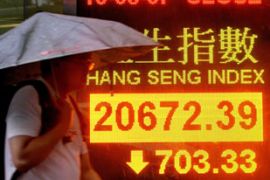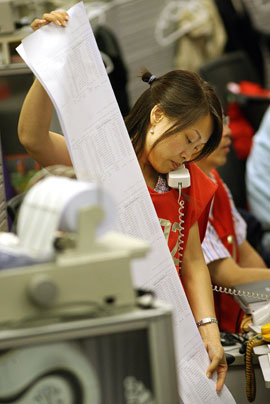Stocks down as credit stays scarce
US Federal Reserve injects a further $17bn into the US banking system.

Published On 16 Aug 2007
Jeremy Batstone-Carr, a finaicial analyst, called the extent of falls “a cause for concern”.
He told Al Jazeera: “I think that in so far as nobody knows the extent of the black hole in many finacial institutions books’ there is the threat that it might get worse.”
In London the Ftse 100 index dropped 4.1 per cent to 5,858.9, trading below the 6,000 mark for the first time since March.
Over 108.9 billion pounds ($216.9bn) has been wiped from the value of Britain’s leading stocks since trading closed last Wednesday.
In Europe, France’s CAC-40 declined 3.3 per cent to 5,265.47 after earlier dropping to its lowest level this year, and Germany’s DAX index fell 2.4 per cent to 7,270.07.
Investigation
 |
| Repercussions from the US credit crunch have rippled across Asia [AFP] |
Growing concern over credit ratings agencies’s slow response to the US subprime mortgage crisis has prompted the European Commission to promise an investigation.
Antonia Mochan, a spokeswoman for the comission, said on Thursday: the body was “going to be looking at the issue of credit ratings agencies, particularly as they relate to the ratings of structured products”.
Repercussions from the US credit crunch have rippled across Asia.
The Bank of Japan also injected 400 billion yen ($3.4bn) into money markets on Thursday, the third time since last Friday it has acted in a bid to curb rises in a key overnight interest rate, but failed to arrest the decline.
Japan’s benchmark Nikkei 225 index closed down nearly 2 per cent on the Tokyo Stock Exchange after falling below the key 16,000-point mark the first time since November.
Meanwhile, Hong Kong’s blue chip Hang Seng Index dropped 3.3 per cent to its lowest close in two months and South Korea’s main benchmark fell 6.9 per cent to its lowest finish since May.
James Soh, a strategist at Korea Investment & Securities Co in Seoul, said: “All of Asia and other European markets are watching the US market.”
Housing slump
Batstone-Carr told Al Jazeea: “Subprime is widely regarded as being the seed of this current cirsis which has now expanded out to include other types of paper… including credit card debt, insurance policies and the like.”
“We probably won’t get an idea [of how severe the problem is] until the end of the third quarter,” he said.
The US housing slump and the rise in property foreclosures have forced dozens of mortgage lenders out of business in recent months.
Shinichi Ichikawa, chief strategist at Credit Suisse, said: “The issue of the [US] subprime loans is not just the problem of that sector but it also affects many related financial products.”
The credit shortage is making it harder for borrowers, including private equity firms – which use debt to fund their buyout deals – to find cash.
Jay Bryson, a global economist with Wachovia in Charlotte, North Carolina, said: “Investors continue to flee from anything that smells of risk, even the tiniest bit.”
In South America, soon after the opening bell, Brazil’s main stock index on Sao Paulo’s Bovespa exchange plunged 4 per cent to 47,313, adding to a 3.2 per cent drop a day earlier.
Source: Al Jazeera, News Agencies